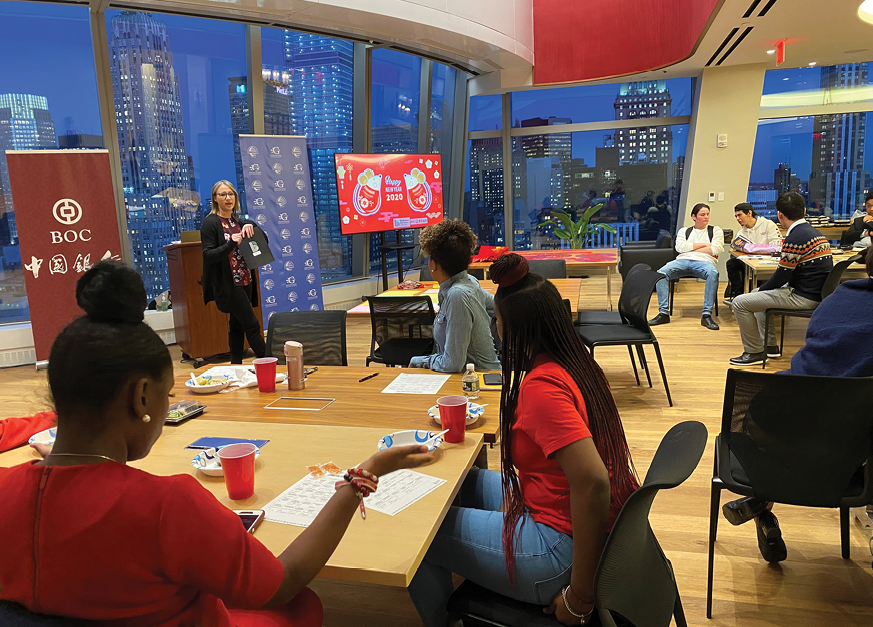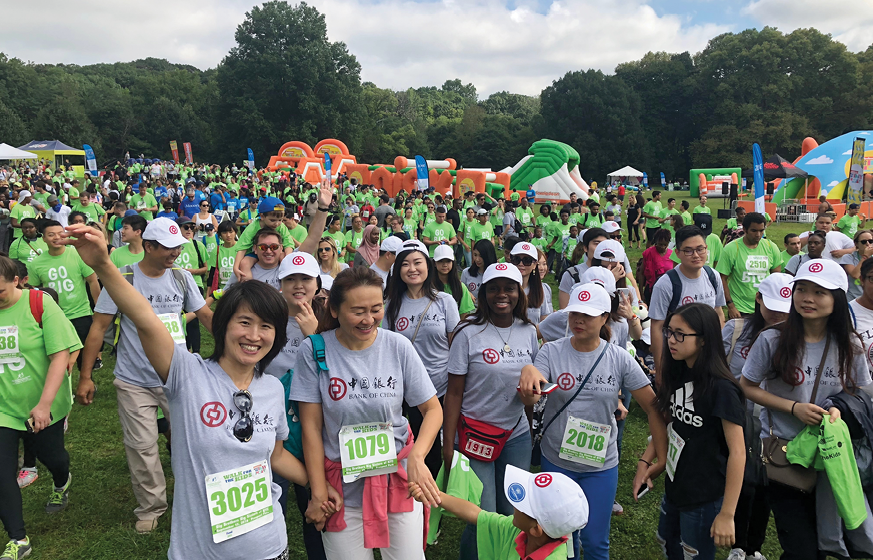- Home
- Media Kit
- Current Issue
- Past Issues
- Ad Specs-Submission
- Ad Print Settings
- Reprints (PDF)
- Photo Specifications (PDF)
- Contact Us

![]()
ONLINE

A Global Bank
with a Local Heart
Editors’ Note
Peter Reisman has almost 30 years of experience dealing with Chinese private and government entities. He is fluent in Hebrew, Chinese language and culture, experienced in sourcing, negotiating, structuring, documenting and closing of equity and debt investments as well as joint venture transactions. He has advised extensively on cross-border investments, as well as bilateral trade negotiations between the United States and China and Israel. Reisman joined the Bank of China U.S.A. in 2017 and leads a group focusing on government and public relations, new business development, marketing, and social impact investing. Earlier, he worked in the Securities Group at Cravath, Swaine, & Moore LLP in New York and in Hong Kong. Following this, he spent six years working for the Israeli government in both a legal and advisory capacity focusing on issues relating to China and other countries in the Asia-Pacific region. Reisman is a member of the China General Chamber of Commerce-U.S.A. and serves as Co-Chair of its Government and Public Relations Committee He is also a member of the National Committee on U.S.-China Relations and the advisory board for AJC’s Asia-Pacific Institute. Reisman was the first American to graduate with a Masters in Law from Peking University Law School. He later went on to obtain a Juris Doctor degree and LL.M. from Columbia Law School.
Company Brief
As China’s most globalized and integrated bank, Bank of China (boc.cn/en) has a well-established global service network with institutions set up across the Chinese mainland as well as in 57 countries and regions. It has established an integrated service platform based on the pillars of its corporate banking, personal banking, financial markets and other commercial banking business, which covers investment banking, direct investment, securities, insurance, funds, aircraft leasing and other areas, thus providing its customers with a comprehensive range of financial services. Bank of China U.S.A. (bankofchina.com/us/en) has branches in New York City, Queens, Chicago and Los Angeles.

BOC U.S.A. Big Brothers Big Sisters Workplace Mentoring Program
How critical is corporate social responsibility to Bank of China U.S.A. and Bank of China Group?
Bank of China (BOC) has worked hard to play a socially responsible role in China for decades, and as a result developed “BOC Philanthropy,” a platform primarily targeted towards poverty alleviation. The bank takes that role seriously and instills that spirit in all of its branches around the world, ensuring that each participates in corporate social responsibility (CSR) programs through contributions of time, donations, sponsorships or expertise, whether in banking, medicine, education, healthcare or science.
At BOC U.S.A., we follow the lead on CSR set by Bank of China Group in Beijing. Accordingly, each Bank of China branch commits itself to giving back to the communities in which it operates by playing an active role in local charitable and philanthropic efforts.
The “local” aspect of our brand – global reach, local expertise – speaks to our focus on U.S. communities as much as it does U.S. businesses. As a foreign bank who has been operating in the U.S. for decades, we continue to learn from our U.S. peers, clients and general corporates on how to improve and strengthen our CSR program to best support U.S. communities across America. BOC U.S.A. is committed to backing local charities and participating in community reinvestment efforts to reverse urban blight. In addition, our staff are ready and willing volunteers in their communities, supporting multiple causes with their time and expertise. Through these efforts, we’ve ensured that CSR is very much on brand at BOC U.S.A.
Will you highlight the areas of focus for Bank of China U.S.A.’s corporate responsibility efforts?
Striving to be a responsible corporate citizen has never been more important to BOC U.S.A. To this end, we carry out diversified practices in public welfare and are dedicated to achieving social well-being and sustainable development in the local communities in which we operate.
As we have deepened our relationships among U.S. communities and businesses, our CSR efforts have broadened beyond China-related initiatives. Last year, we formed a working group tasked with addressing the financial, service and credit needs of the communities around us. The working group has acted as the catalyst in our efforts to expand the foundation of BOC U.S.A. Community Reinvestment Act (“CRA”) programs, which bring people together to create sustainable solutions for our communities. Through one of several CRA programs, BOC U.S.A. provides financial support for 80/20 low- and middle-income housing projects across the New York metropolitan area. Since 2012, BOC U.S.A.’s branches in New York have provided loans, investments and other services under the CRA program that have totaled almost $2 billion.
In addition, we contribute to local and national philanthropic organizations and scholarships, including the China General Chamber of Commerce Foundation, Big Brothers Big Sisters of New York City, Robin Hood, Jump$tart Foundation, World of Money, Breaking Ground, Cents Ability Foundation, New York Governor’s Annual Toy Drive and Neighborhood Housing Services of New York City. We’ve also helped sponsor a Newark Liberty Science Museum program for underprivileged kids. We encourage our employees to sit on the boards of these organizations, volunteering their services and making significant contributions through ideas, education and more structured participation. On this front, BOC U.S.A. employees sit on the boards at Cents Ability and Big Brothers Big Sisters of New York City.
How has BOC U.S.A.’s CSR strategy changed over the years?
In the past, BOC U.S.A.’s CSR efforts focused primarily on organizations that were China- or Chinese-related. As we’ve deepened our relationships among U.S. communities and with U.S. businesses, we’ve broadened our CSR focus considerably. To that end, we’ve shifted to supporting the neediest communities around us, focusing on areas of poverty alleviation, education and financial literacy.
However, we still acknowledge the importance of using the bank’s position and heritage to support organizations and events that help bridge the cultural gap between the U.S. and China. For example, BOC Group gave $250,000 to sponsor Mirroring China’s Past: Emperors and Their Bronzes, an exhibition at the Art Institute of Chicago that showcased Chinese bronzes of the second and first millennia B.C. BOC U.S.A. also supported relief efforts for Hurricane Katrina.
We also work with the China General Chamber of Commerce (CGCC) Foundation to support its mission of increasing communication, understanding and cooperation between our two great nations. BOC U.S.A. employees have participated in some of their outreach and charitable efforts, as well as helped support their business-related and cultural exchanges. CSR at BOC U.S.A. really encompasses both efforts, helping to build a more harmonious bridge between the U.S. and China, and support for communities in need across New York, Chicago and Los Angeles.

BOC U.S.A. employees and their families participating
in the annual Big Brothers Big Sisters “Walk for the Kids”.
How important is it to have a strong commitment from Bank of China leadership in order to drive success in BOC U.S.A.’s CSR efforts?
BOC Group does a great job of setting a clear tone on CSR. Leadership in Beijing reviews progress on the Bank’s overall CSR efforts annually in a report that it circulates publicly on its website. However, despite its overarching directives, BOC Group also grants latitude to each domestic and overseas branch to find its own approach and innovate to fit its community’s specific needs. For CSR programs that require a significant investment, our head office in Beijing is often willing to provide additional financial support, especially to programs that focus on cross-border cooperation and cross-cultural programs that will enhance knowledge and expertise as the U.S. and China grow closer together.
BOC U.S.A.’s executive management team encourages employees in its New York, Chicago and Los Angeles branches to develop and participate in programs that support low-income families and communities. They also support and participate in various new CSR initiatives that have broadened our support across local communities in the U.S.
What are the keys to driving employee engagement in BOC U.S.A.’s CSR efforts?
Embracing both top-down and bottom-up engagement is significant. Our approach can’t just be a one-sided affair. As I mentioned, CSR is important across Bank of China. Management sets the parameters for employee engagement such as through Volunteer Together, but only as a starting point.
As an example, BOC’s New York branch supported the annual “NYC Walk for the Kids,” a program hosted by Big Brothers Big Sisters of NYC that provides one-on-one adult mentoring support for primary- and middle-school students from low-income families. New York branch employees walked five kilometers in Prospect Park, Brooklyn, to raise funds for mentoring programs that helped more than 5,000 children. Before the event, we sent out an e-mail to the entire bank to encourage participation and a lot of employees came out with their families.
My office reviews all CSR-related material, which we then send along to the executive management committee for approval.
On the other hand, it’s sometimes our employees who drive engagement and participation in CSR or CRA-related causes and events. Each year the foundation of the City University of New York’s Borough of Manhattan Community College (BMCC) holds a gala to fund scholarships. BOC employees brought the event to our attention, made the case for us to push it up the chain of command, and encouraged broader participation.
How do the areas that BOC U.S.A. supports in CSR align with its business?
As I expressed earlier, CSR is deeply ingrained in the philosophy here in the U.S. and as socially and environmentally conscious business practices spread across the U.S. business landscape, it’s getting easier to align our CSR mandates with those of our clients.
At BOC U.S.A., we believe in acting responsibly and with integrity. As a global bank with a local heart, our CSR engagement focuses on investing in long-term projects and initiatives that generate a positive societal or environmental impact. We understand that listening to our stakeholders undergirds a successful CSR strategy. We’re in constant dialog with shareholders, employees, communities, partners and customers as an ongoing matter of course to identify the most pressing environmental, social and governance issues and ensure that they inform our decision-making and accountability. It’s not that difficult to align CSR with our business because CSR is good business.
What metrics does Bank of China U.S.A. use to track the impact of its CSR programs?
We keep track of our Community Reinvestment Act efforts. The Office of the Comptroller of the Currency (OCC) monitors and evaluates CRA compliance among certain banks, conducting examinations every three years and publishing the results.
In our most recent CRA exam, we received a Satisfactory rating. Over the course of the last 20 years, all of our exams have netted us either “Outstanding” or “Satisfactory” ratings which is something we work hard to maintain.![]()